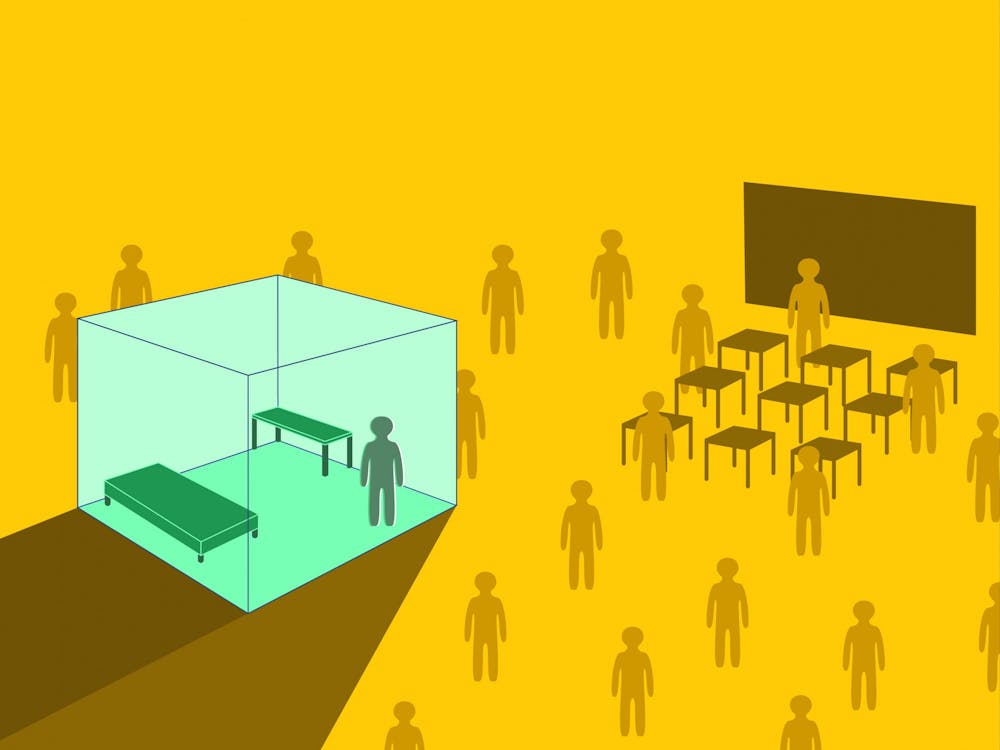With the return of in-person classes, students have been in and out of the classroom quarantining after exposure to the coronavirus. It is tough to imagine the instruction they’re missing and the assignments that these students are accountable for while they’re away. Students are put in a difficult position, through no fault of their own, of keeping up with their academic responsibilities while professors continue through the curriculum regardless of who shows up for class.
According to the office of the Provost, COVID-related absences are treated as excused absences, but that is the only guideline professors are required to follow for students who are quarantining. Vice Provost Sandra Kelly said, “Make-up work for excused absences can take many forms and is at the discretion of the faculty member.”
For some students, this presents no problems. Emily Brock tested positive for COVID during her second year studying nursing. Her only symptoms were not being able to taste or smell, but she was still capable of completing her schoolwork.
“I didn’t tell [my professors] because I was online anyway,” Brock said.
Blake Walker is a third-year philosophy major and tested positive in late September of this year. Walker fell behind in his classwork, but felt it was through no fault of his professors.
“The way my classes are with philosophy it wasn’t a big deal that I missed it,” Walker said. “[The professors] were very nice and understanding. They just said ‘Let me know if you need anything.’ But I just skipped those two weeks of class.”
Joanna Logue, a third-year biological sciences major, had a different experience. Logue went into immediate isolation when she tested positive in March of 2021.
“I though I had a really bad cold … I was really nauseated and my stomach was all messed up,” Logue said. “I couldn’t even attend online classes because I would get nauseous staring at my screen for more than 20 minutes.”
Logue was proactive about the situation. She emailed all of her professors and told the University her test results. The University then sent another email to all of her professors to notify them of her diagnosis. Some of Logue’s professors delayed her due dates. Two of her professors never responded to her email.
“It really just depended on the professor and the type of class. For my STEM classes, those were the ones where I fell behind and had to work harder to catch up. It also happened to be my STEM classes that the professors were not good at helping me catch up,” Logue said.
One of Logue’s statistic professors was particularly unsympathetic. When Logue felt too ill to complete her assignments, she emailed her teacher days before the due date to say that she needed an extension. When the professor didn’t respond, Logue reached out to the University. The University sent a follow-up email to the professor and pointed Logue to the Student Success Center.
Logue eventually mustered the strength to complete her statistic’s assignments since the professor still hadn’t gotten back to her. The professor finally emailed her on the night the assignment in question was due saying he would look into extending the deadline.
“My statistics class was asynchronous and was very large. The professor had just been really bad with communication throughout the semester, so it wasn’t surprising … I went through multiple avenues to try to get this professor to respond to me,” Logue said. “He replied on the day the assignments were due so I had already done them because he replied at eight o’clock at night.”
Professors deal with hundreds of students each semester while students are expected to keep up with their work for five classes. If you keep your ears up, you can hear both professors and students complaining about their large workload. With this being that case, let's treat each other with a little extra empathy during these "unprecedented times.”



